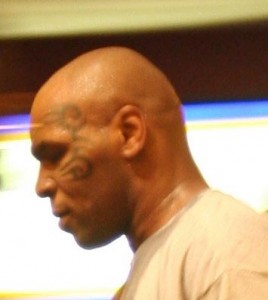 Now that sporting a tattoo has gone mainstream, it would only stand to reason – – given that tattoos are creative expressions fixed in a tangible medium (skin) – – that tattoo artists seek protection of their designs under copyright law. To date, few copyright cases involving tattoos have been filed but we’ve learned that video game companies, in particular, are not taking chances. Here’s some background.First, why you may ask is a tattoo deserving of copyright protection? Section 102 of the Copyright Act provides protection for “original works of authorship fixed in any tangible medium of expression.” “Works of authorship” include a number of categories, including pictorial and graphic works. There should be little controversy that a tattoo design is equivalent to a graphic or pictorial work and that skin is a tangible medium of expression. The question of determining “originality” would be the same as for any graphic work. But once created, who owns the image? The customer or the artist? Copyright law would assign ownership rights to the artist unless there is a license or assignment of the rights to the customer. There are other interesting issues. Could photographs of the wearer in which the tattoos are visible be actionable copyright infringements? What about video games? NBA stars, for example, adorn themselves with tattoos. Do video game companies need a license to portray the stars and their tattoos and, if so, from whom do they obtain licenses, the wearer or the artist?
Now that sporting a tattoo has gone mainstream, it would only stand to reason – – given that tattoos are creative expressions fixed in a tangible medium (skin) – – that tattoo artists seek protection of their designs under copyright law. To date, few copyright cases involving tattoos have been filed but we’ve learned that video game companies, in particular, are not taking chances. Here’s some background.First, why you may ask is a tattoo deserving of copyright protection? Section 102 of the Copyright Act provides protection for “original works of authorship fixed in any tangible medium of expression.” “Works of authorship” include a number of categories, including pictorial and graphic works. There should be little controversy that a tattoo design is equivalent to a graphic or pictorial work and that skin is a tangible medium of expression. The question of determining “originality” would be the same as for any graphic work. But once created, who owns the image? The customer or the artist? Copyright law would assign ownership rights to the artist unless there is a license or assignment of the rights to the customer. There are other interesting issues. Could photographs of the wearer in which the tattoos are visible be actionable copyright infringements? What about video games? NBA stars, for example, adorn themselves with tattoos. Do video game companies need a license to portray the stars and their tattoos and, if so, from whom do they obtain licenses, the wearer or the artist?
In 2011, in perhaps the first lawsuit of its kind, Victor Whitmill, a tattoo artist — most notable for creating the Maori inspired tattoo on the side of Mike Tysons’s face — sued Warner Brothers Entertainment in an attempt to stop the release of the movie “Hangover Part II” in which one of the characters was tattooed in identical manner to that of Mike Tyson. Whitmill claimed copyright infringement resulting from the film’s promotional activities showing the tattoo, demanded that release of the movie be stopped, and other costs and damages.
The judge agreed that Mr. Whitmill had “lost control over the image he created” and that Whitmill had a legitimate copyright claim in his tattoo design, Yet, the court refused to grant Mr. Whitmill’s request for a preliminary injunction ruling that “the public interest does favor protecting the thousands of other business people in the country as well as Warner Brothers” connected to the film and its promotion. The parties eventually settled. Though not the final word on the matter, the court’s decision sets the stage for similar type actions by those seeking to protect tattoo designs.
As a result of this lawsuit — and good business sense — certain media companies and sport groups, according to the Wall Street Journal, weren’t taking chances. The NFL players Association was urging athletes to obtain licenses for their body art and Electronic Arts (EA) reported that for its latest video game “Madden NFL 15”, that it scanned images of tattoos only from after getting legal authorization from the artist who drew them. Apparently, tattoo artists are more than willing to sign releases when presented to them by sports athletes.If you’d like to learn more about the legal basis for claiming copyright protection in tattoo art, don’t hesitate to call the lawyers at Lipton, Weinberger & Husick.
– Adam G. Garson, Esq.

